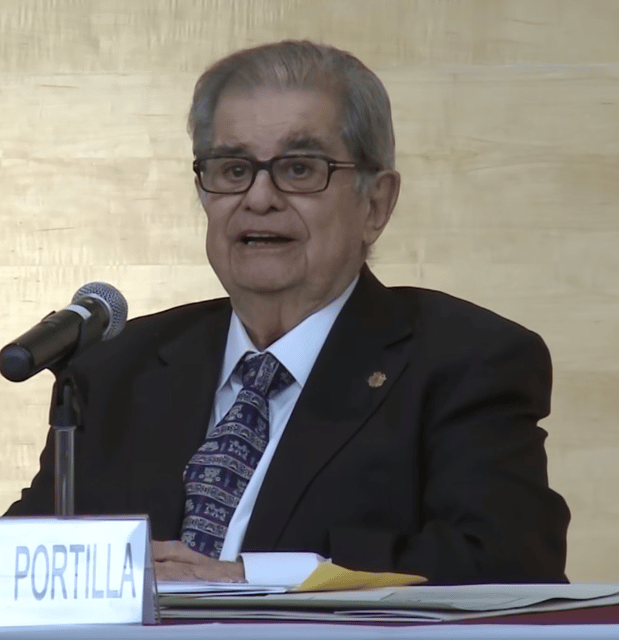Miguel León-Portilla

Miguel León-Portilla

Miguel León-Portilla | |
|---|---|
| Born | (1926-02-22)February 22, 1926 |
| Nationality | Mexican |
| Occupation | Philosopher, anthropologist, historian |
Miguel León-Portilla (born 22 February 1926 in Mexico City) is a Mexican anthropologist and historian, and a major authority on Aztec thought and literature in the prehispanic and colonial eras. Many of his works have been translated to English and are widely read. The Library of Congress bestowed on him the Living Legend Award in 2013.[1]
Miguel León-Portilla | |
|---|---|
| Born | (1926-02-22)February 22, 1926 |
| Nationality | Mexican |
| Occupation | Philosopher, anthropologist, historian |
Early life and education
Miguel León-Portilla had an interest in indigenous Mexico at an early age, fostered by his uncle Manuel Gamio, a distinguished archeologist. Gamio had a lasting influence on his life and career, initially taking him as a boy on trips to important archeological sites in Mexico and later as well. León-Portilla attended the Instituto de Ciencias in Guadalajara and then earned a B.A. (1948) and M.A. summa cum laude (1951) at the Jesuit Loyola University in Los Angeles. Returning to Mexico in 1952, he showed Gamio a play he had written on Quetzalcoatl, which resulted in Gamio introducing his nephew to Ángel Garibay K.. Garibay's publications in the 1930s and 1940s first brought Nahuatl literature to widespread public attention in Mexico. Needing to make a living, León-Portilla began attending law school and worked at a financial firm. At the same time he taught at Mexico City College, an English-language school in the Condesa neighborhood. Other instructors included important scholars of Mexican indigenous history and culture, Wigberto Jiménez Moreno, Fernando Horcasitas, and Eduardo Noguera. Gamio persuaded León-Portilla to drop his law studies and job in business to work at the Instituto Indigenista Interamericano, which Gamio directed. León-Portilla begin graduate studies at UNAM, completing his doctoral dissertation, “La Filosofía Náhuatl estudiada en sus fuentes,” which launched his scholarly career.[2]
Career
His dissertation Nahua philosophy was published in Mexico, and then translated to English as Aztec Thought and Culture: A Study of the Ancient Nahuatl Mind (1967) and then many other languages.[3] It was the first of his many works to be translated to English. His translations of Nahuatl and Spanish texts on the conquest of Mexico, first published in Mexico as Visión de los vencidos, translated to English as The Broken Spears, is the way many undergraduate students in the United States are introduced to accounts from indigenous participants and not Spanish conquistadors.[4]
León-Portilla has spearheaded a movement to understand and re-evaluate Nahuatl literature and religion, not only from the pre-Columbian era, but also that of the present day, especially since Nahuatl is still spoken by 1.5 million people.[1] His works in English on literature include Pre-Columbian Literatures of Mexico (1986).,[5] Fifteen Poets of the Aztec World (2000),[6] and with Earl Shorris, In the Language of Kings: An Anthology of Mesoamerican Literature, Pre-Columbian to the Present (2002).[7] He has also compared the literature of the Nahuas with that of the Inca.[8] Another area of research is on indigenous religion and spirituality, with works including Native Meso-American Spirituality (1980),[9] and South and Meso-American Native Spirituality: From the Cult of the Feathered Serpent to the Theology of Liberation (1997)[10] He has also published a work on the Maya, Time and Reality in the Thought of the Maya (1990).[11]
León-Portilla was instrumental in bringing to light the works of Franciscan Fr. Bernardino de Sahagún, a 16th-century primary source on the Aztec civilization, whose twelve-volume General History of the Things of New Spain, often referred to as the Florentine Codex are crucial for understanding Nahua religion, society, and culture, as well as an account of the conquest of Mexico from the Mexica viewpoint. León-Portilla was the first to denote Sahagún as the "Father of Anthropology in the New World".[12]
He has contributed to the understanding of the development of the field of Mesoamerican history in Mexico. With Garibay, León-Portilla made contributions to the study of nineteenth-century Mesoamerican historian Manuel Orozco y Berra.[13][14] León-Portilla also published two volumes on the work Mexican humanists, including his mentor Garibay.[15]
A subordinate but important interest of León-Portilla has been the early history and ethnography of the Baja California Peninsula. He has addressed this region in more than 30 books and articles, including a 1995 volume collecting several of his earlier publications.[18]
Early in his academic career in 1969, he was awarded a Guggenheim Fellowship.[19] the first of many academic awards and recognitions, including the Belisario Domínguez Medal of Honor, the highest award bestowed by the Mexican Senate. In 1995, he was elected to membership of the National Academy of Sciences.[20] On December 12, 2013, León-Portilla received the Living Legend Award from the U.S. Library of Congress.[1]